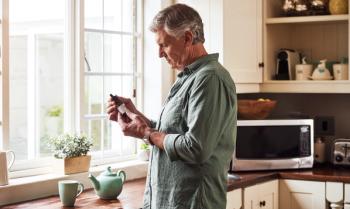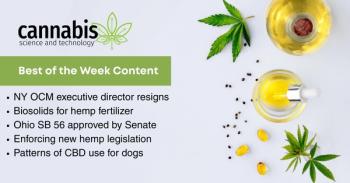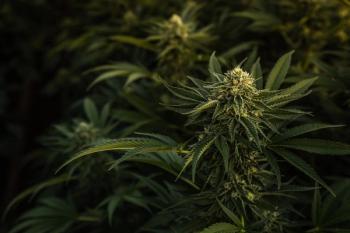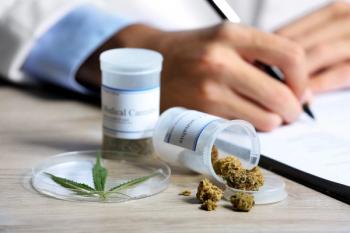
Cannabis Science and Technology
- September 2020
- Volume 3
- Issue 7
Treating Immunocompromised Patients During the COVID-19 Pandemic: A Conversation with Dr. Bonni Goldstein

An interview with Dr. Bonni Goldstein on treating patients during a pandemic, telemedicine, cannabis research, and more.
Everyone has been affected by the COVID-19 pandemic and most of us have had to adjust our work schedules in creative ways. I had the opportunity to discuss what it is like to treat immunocompromised patients in these challenging times with Dr. Bonni Goldstein. Many of you know Dr. Goldstein from the critically acclaimed documentary, Weed the People (1), or from her amazing keynote presentations at past Cannabis Science Conferences by CSC Events, LLC (2).
Can you tell our readers a little about your practice and the type of patients you treat?
Dr. Bonni Goldstein: My practice opened in 2008 and I was hired on as Medical Director. I purchased the practice in 2011. Since I trained as a pediatrician, I am focused on treating pediatric patients with severe epilepsy, autism, cancer, autoimmune disorders, and other serious conditions. I still follow many of our adult patients who have been coming to my practice for many years. Most suffer with chronic pain, mood or sleep disorders as well as cancer, post-traumatic stress disorder (PTSD), and some other serious illnesses.
How have you adapted to treating patients during the COVID-19 pandemic?
Dr. Goldstein: Since we have so many vulnerable patients, I am now seeing everyone through telemedicine only. Everyone seems to be accepting of this “new normal,” although I miss seeing my pediatric patients in person.
How is telemedicine different from seeing patients in person? Have you seen an improvement in telemedicine technologies?
Dr. Goldstein: I was doing some telemedicine prior to COVID-19 as some patients who have serious conditions found it difficult to travel to my office. So not much has changed. There are so many telemedicine platforms available to physicians that it is quite easy to continue to take care of patients and connect with them when they need advice.
Are you aware of or involved with any research studies or clinical trials that involve cannabinoids as treatments for COVID-19? If not, do you have any thoughts on potential opportunity here?
Dr. Goldstein: It appears that COVID-19 causes a severe “cytokine storm” in some patients, where an over-abundance of cytokines—a group of inflammatory chemicals released from our immune cells—are released and create havoc. It is this “hyper-immune inflammatory” response that leads to severe and often fatal respiratory symptoms, causing acute respiratory distress syndrome (ARDS). Although COVID-19 is new to us, cytokine storm and ARDS are well known to physicians and researchers as numerous other infections cause the same response. In 2015, a group of researchers at the University of South Carolina School of Medicine demonstrated that tetrahydrocannabinol (THC), with its well-known anti-inflammatory properties, can improve survival in animals with cytokine storm and ARDS. They used a mouse model of enterotoxin (a toxin that affects intestines, such as one might experience with food poisoning) to trigger cytokine storms and ARDS. The mice that received the toxin and no treatment all developed cytokine storm and ARDS, resulting in the death of 100% of mice by day 5. The mice that received the toxin and then received four daily doses of THC all survived and were found to have decreased cytokines and lung inflammation. These types of results—100% mortality without THC versus 100% survival with THC—is certainly worth pursuing further, especially since we are struggling to find effective and safe treatment for COVID-19. In another mouse study, just published in July 2020, researchers found “a potential protective role for CBD [cannabidiol] during ARDS that may extend CBD as part of the treatment of COVID-19 by reducing the cytokine storm, protecting pulmonary tissues, and re-establishing inflammatory homeostasis.” Another study from Israel reported CBD plus a specific terpene combination treated life-threatening cytokine storm and was more effective than CBD isolate and also more effective than a corticosteroid commonly used for this condition. So, there is no question in my mind that human clinical trials of CBD and THC are indicated to help prevent death and potentially all or some of the complications associated with this terrible virus (3-5).
Aren’t “cytokine storms” also associated with the use of ibuprofen and other nonsteroidal anti-inflammatory drugs (NSAIDs) during COVID-19?
Dr. Goldstein: At the beginning of this pandemic, there was some question as to whether or not NSAIDs (such as ibuprofen and naproxen) worsened the outcome for those with COVID-19. As of the latest findings, there is not enough evidence to say whether NSAIDs are dangerous or beneficial for those with COVID symptoms. French researchers are recommending those with COVID-19 avoid NSAIDs until more is known (6), however the World Health Organization (WHO) recognizes that there is no evidence so far to prove that NSAIDs make coronavirus worse. They are no longer recommending against the use of NSAIDs as they did a number of months ago. It is very important that people understand that we do not know the complete story with COVID-19 and that it is going to take more time to fully comprehend the critical aspects of this virus that will lead the medical community to making “correct” recommendations. We should all expect that COVID-19 recommendations will change over time as we learn and understand more about this virus.
I read your article entitled, “Trade-in Your Ibuprofen for Cannabis” on your website
Dr. Goldstein: Yes! It is crazy to think about how we consider NSAIDs to be “very safe” because they are sold over the counter. I meet people in my practice who go through a big bottle of ibuprofen every month! The side effects are real and can be quite dangerous, but cannabis is a great alternative and since we have numerous nonintoxicating cannabinoids on the market, those that are not interested in experiencing this effect can still use cannabis to help with inflammatory pain.
How do patients suffering with inflammation know which cannabis is best for anti-inflammatory effects?
Dr. Goldstein: This is a great question. THC, CBD, and many other cannabinoids are anti-inflammatory. Since we have been unable to do human clinical trials to see which one might work best for certain inflammatory conditions, patients are left to figure it out for themselves. For those who struggle with inflammation as part of their illness (which is almost everyone as inflammation is the common denominator for so many conditions), I encourage the use of both CBD and THC in various ratios depending on a person’s response and preference. Some patients prefer to use high ratio CBD:THC products and others find lower ratios to be beneficial. Additionally, the raw phytocannabinoids THCA and CBDA both have anti-inflammatory properties and can be taken as well and I often recommend them in conjunction with CBD or THC as the synergies between these compounds can often give great results. Furthermore, beta-caryophyllene, a terpene that is also considered a cannabinoid since it binds to the Type 2 cannabinoid receptor, has potent anti-inflammatory properties as well and should be included in an anti-inflammatory cannabinoid medicine regimen.
References
https://www.weedthepeoplemovie.com/ .https://www.cannabisscienceconference.com/ .https://www.healtheuropa.eu/.successful-initial-results-using-cannabis-terpenes-to-treat-covid-19/101986/ .https://bpspubs.onlinelibrary.wiley.com/doi/full/10.1111/bph.13026 .https://www.liebertpub.com/doi/abs/10.1089/can.2020.0043 .https://www.sciencedirect.com/science/article/pii/S1043661820311579 .http://www.bonnigoldsteinmd.com/trade-in-your-ibuprofen-for-cannabis/ .
About the Interviewee
A native of New Jersey, Dr. Bonni Goldstein received her undergraduate education at Rutgers College. She pursued her medical degree at Robert Wood Johnson Medical School at the University of Medicine and Dentistry of New Jersey. Her post-doctoral education included internship and residency at Childrens Hospital Los Angeles. Dr. Goldstein also served as Chief Resident at Childrens Hospital Los Angeles. She was a Clinical Instructor in Pediatrics at USC School of Medicine in Los Angeles, Emergency Transport Attending Physician at Childrens Hospital Los Angeles, and Emergency Medicine Attending Physician in the Pediatric Emergency Department at Los Angeles County-USC Medical Center. In 2008, Dr. Goldstein developed an interest in the science of medical cannabis after witnessing its beneficial effects in an ill friend. Since then she has been evaluating both adult and pediatric patients for use of medical cannabis. Dr. Goldstein has given numerous lectures to many patient support programs, including the Cancer Support Community, Southern California Prosthetics, and Pediatric Epilepsy. She has also lectured at CannMed 2016 at Harvard University, United in Compassion Medical Cannabis Symposium in Sydney, Australia, Patients Out of Time 2015, and United Patients Group Conference 2016. She is currently the Medical Director of Canna-Centers, a California-based medical practice devoted to educating patients about the use of cannabis for serious and chronic medical conditions. She is a Medical Consultant to WeedMaps.com. She is a Member of the International Association of Cannabis as Medicine, the International Cannabinoid Research Society, and the Society of Cannabis Clinicians.
ABOUT THE COLUMNIST
Joshua Crossney is the columnist and editor of “Cannabis Crossroads” and a contributing editor to Cannabis Science and Technology magazine. Crossney is also the president and CEO of CSC Events.
Direct correspondence to:
How to Cite this Article
J. Crossney, Cannabis Science and Technology 3(7), 16-17 (2020).
Articles in this issue
about 5 years ago
The Pet Lab Syndromeabout 5 years ago
To Grind or Not To Grindabout 5 years ago
Budtender: Is That a Harmful Mold in My Bud?about 5 years ago
The Hidden Costs of Falling FilmsNewsletter
Unlock the latest breakthroughs in cannabis science—subscribe now to get expert insights, research, and industry updates delivered to your inbox.





